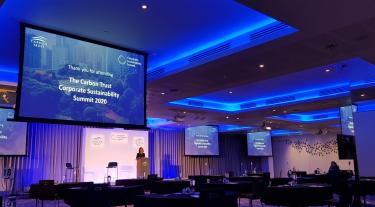The Summit was dominated by the twin imperatives of tackling the pandemic and the need to move to net zero economies, concerns that come together in the rallying cry of 'build back better'.
Launching the Summit, Tom Delay, Chief Executive of the Carbon Trust, highlighted the importance of the net zero transition and the business community’s role in that transition. The process has moved “from Paris to Greta to Covid," he said. “The Paris Agreement was all about aligning around a common aim, Greta has engaged the future and sent a message to corporations and governments that the people who will vote, buy and save in future want action. Meanwhile, the pandemic has shown us that we can change a lot more quickly than we thought we could.”
Humanity is at a crossroads and must shift from business as usual across a wide range of activities, added Dr Marcia Balisciano, Chair of the UN Global Compact Network UK and Head of Corporate Responsibility at RELX. “The trade-off between growth and environment has been debunked,” she added. “We must build back better using innovative approaches and renewable materials.”
Lei Zhang, Founder and CEO of Envision Group, was one of many speakers who highlighted the importance of technology in achieving net zero, driven by a grid empowered by artificial intelligence and the Internet of Things and extremely cheap renewable energy. “The net zero world is so attractive because it will bring almost zero-cost energy, which will open up innovation and make the world much better.”
The future will be digital, pointed out Steve Martineau, UNFCCC COP26 High Level Climate Action Champions lead for Mobile and ICT. The tech sector can deliver huge amounts of value creation and productivity without adding significantly to global emissions, he told the Summit.
Mark Evans, Chief Executive of O2, highlighted the urgency of acting and the importance of collaboration to explain why O2 is looking to help other businesses emulate its journey to net zero. “We don’t have time for reinvention. Partnership is key – we can only do this if we work together,” he stressed.
Collaboration across the value chain is critical, agreed Charles Brand, President of Tetra Pak Europe and Central Asia. “Companies cannot achieve the necessary changes if they act in isolation,” he said.
But the Summit also heard that the need to rebuild the economy after the pandemic can be aligned with the need to decarbonise the economy. “The green economic recovery has become a powerful rallying cry,” said Carbon Trust Director Simon Retallack.
“The green recovery touches on many of our priorities for recovering from Covid," said Baroness Brown, Deputy Chair of the Committee on Climate Change and Chair of the Carbon Trust.
In addition, “the pandemic has brought about new ways of working that we could not have envisioned even 12 months ago,” said Uffe Kaare Rasmussen, Senior Director for Compliance and Sustainability at pharmaceuticals group Lundbeck.
The more detailed, business-focused sessions highlighted some of the ways that businesses and investors are stepping up to the challenge, from Cemex’s pledge to deliver carbon-neutral concrete, to Velux’s aim of achieving lifetime carbon neutrality by its 100th anniversary in 2041. Karen Basiye, Head of Sustainable Business and Social Impact at African telecoms group Safaricom, stressed the importance of measuring your carbon footprint and knowing your status. “If you don’t measure, you don’t know where your key gains will be,” she pointed out.
Equally important are clear policies and a long-term perspective from government that allows business to strategically invest in areas that align with those policies. Sarah Jones, Environment Manager at Siemens, told the Summit, “business is often ahead of the curve on these issues and comes up against boundaries, for example on the phasing out of petrol and diesel cars.”
Summing up, Hugh Jones, Managing Director - Advisory, at the Carbon Trust, reinforced the message that, “this is no longer the interest of a few, but the imperative of many. Sustainability is at the heart of all the important decisions that companies make today.”
One of the key themes of the Summit was the importance of togetherness and the need to convert that into collaboration, he added. This is something the Carbon Trust has been heavily involved in, through initiatives such as the Offshore Wind Accelerator, but it is also happening along supply chains, for example in O2’s use of the Carbon Trust Supply Chain Standard. In addition, the development of the circular economy is all about collaboration.
“Climate leaders are not just on the right trajectory themselves, but also have the ability to advocate and bring others along with them,” he concluded.
Insight: Perspectives on the corporate sustainability challenge
About the Carbon Trust
The Carbon Trust is helping to drive corporate sustainability across the world, partnering with businesses to help them set science-based targets, reduce climate impact and transition to a low carbon economy.


